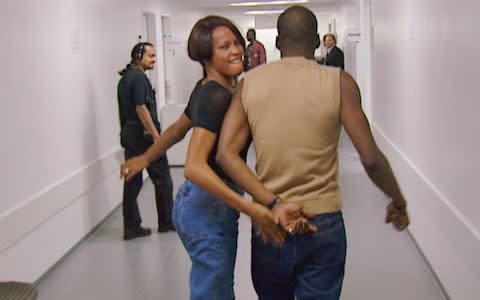Whitney: Can I Be Me review: an unbearably sad show business puzzle still waiting to solved

Directors: Nick Broomfield, Rudi Dolezal; Starring: Whitney Houston, Bobby Brown, Robyn Crawford, Cissy Houston (archive footage). 15 cert, 105 mins.
Perhaps the saddest thing about Whitney Houston’s story is the way that, five years after her death, it looks more and more like a blueprint for a certain kind of fame – one in which God-given artistry is burnt out by tense familial relations, a wayward lover, drugs and overwork.
Recent films by Asif Kapadia and Amy Berg told versions of this cautionary tale as lived by Amy Winehouse and Janis Joplin. So in Whitney: Can I Be Me, you can understand Nick Broomfield’s determination to pick a new route around its tragic contours.
Anyone familiar with the wily documentarian’s work will know that sidling up to salacious material from unexpected angles is one of Broomfield’s stock-in-trade manoeuvres. That said, he remains behind the camera at all times here: there are none of the heart-in-mouth authorial interventions here that made his earlier musical tragedy films, 1998’s Kurt & Courtney and 2002’s Biggie & Tupac, such prickly watches.
His approach here instead rests on a trove of never-before-seen backstage footage shot by Broomfield’s co-director Rudi Dolezal on Houston’s 1999 world tour, for an at-the-time fly-on-the-wall piece that didn’t come off. What Dolezal’s camera had captured was an unhappy point of no return on the singer’s 48-year journey from working-class New Jersey beginnings to that brimful Beverly Hills bathtub and her sorry demise.
We’re told early on that the film’s subtitle – "Can I be me?" – was something Houston often asked during her early career, when her producer Clive Davis, sensing superstar potential, steered her towards the pop charts and away from the kind of funk and soul that would leave ‘mainstream’ (i.e. white) listeners flustered.
Broomfield uses the question as a kind of cipher with which to decode her relationships with four key figures in her life: Bobby Brown, the R&B lover-boy (and later husband), Robyn Crawford, her long-time female confidante and rumoured lover, and her mother and father, Cissy and John, both of whom were paid-up employees of Whitney Houston PLC.
Each one presented a challenge to Houston’s star persona. Brown was a link to the black street culture her early musical choices had disavowed, Crawford the on-the-quiet girlfriend whose very existence undermined her spotless pop princess credentials, while her parents’ dedication to their daughter’s wellbeing – as opposed to her money-making potential – looked more parlous with every accolade and cheque.

With so much riding on Whitney Houston the star, what hope for Whitney Houston the person? As Kirk Whalum, her saxophonist on that 1999 tour, puts it: “That was the conundrum.”
It proves to be a knotty one – and Broomfield’s process, which depends on darting between time periods and topics in a join-the-dots search for answers, has only limited success in untangling it. Most useful are the humane, perceptive interviews with Houston’s backing band and bodyguard, which bring more clarity to the situation than Dolezal’s footage, which is often barely discernible from a home movie.
But parts of it tingle with a creepy, curtain-parting intimacy. There is an unsettling hotel room sequence in which Houston and Brown play-act as Ike and Tina Turner – as if on some subliminal level, the couple were aware they were just the latest players to take on the central roles in some strange, endlessly recurring show-business tragedy.

But for a film that treats Houston’s downfall as a puzzle to be solved, there are too many pieces missing for comfort – perhaps because the 1999 footage simply doesn’t address them. Late on, Broomfield turns to the unbearably sad story of Houston and Brown’s daughter Bobbi Kristina, and a video of Houston coaxing the then-six-year-old girl on stage, seemingly to kindle audience sympathy, looks hair-raisingly ill-advised in retrospect.
But the film seems either unwilling or unable to push on with the thread in comparable detail, and it soon frays along with others – while Brown’s domestic abuse is barely mentioned.
The upshot is a film that feels simultaneously too long and too short, and Houston’s story, though exhaustively picked over, only feels half-told.


